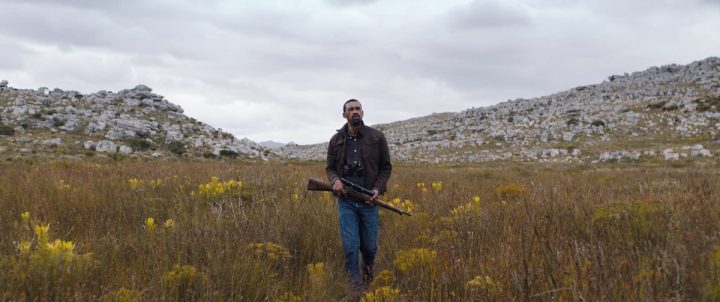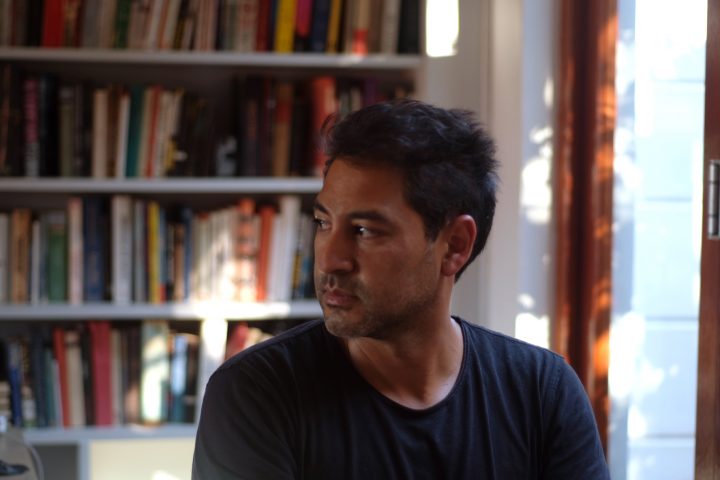Trapped by history
Mexican American director John Gutierrez new film, set in Cape Town, South Africa, touches on colonialism, displacement, and man’s complicated relationship with nature.

Still from Sons of the Sea.
- Interview by
- Dylan Valley
Abalone (or marine snails) is a hot commodity on the black market. It is a luxury food item particularly sought after in the far East and Europe. It is not surprisingly, also the life blood of working class families of fishermen who poach the marine mollusk from protected waters. Large syndicates, often linked to the drug trade or turf gangs, act as middlemen in the trade. South Africa, especially the coast around Cape Town, is a key node in this illegal trade. Just earlier this month, Cape Town police arrested 65 suspected abalone poachers in one day.
Sons of the Sea is a new feature film by Mexican-American director John Gutierrez. (The film had its premiere at Cinequest in March 2021 and will be showing again at the Durban International Film Festival in South Africa which takes place between 22 July and 1 August. 2021.) The film is set on the False Bay coast in Cape Town. The plot follows two brothers from the “council flats” on the wrong side of the tracks of the picturesque fishing village and tourist haven of Kalk Bay. One of the brothers stumbles across a motherload of poached abalone, or perlemoen as it is known locally. Older brother Mikhail (Marlon Swartz) sees it as his last ticket out of the ghetto, while for younger brother Gabe (Roberto Kyle) it could spell the end of a promising future. As they figure out a plan to sell the abalone on the black market, a rogue city council official (Brendon Daniels), who has his own set of personal tragedies to deal with, begins to hunt them down.

Without being didactic, the film touches on colonialism, displacement, and man’s complicated relationship with nature. It is a beautifully shot, authentically performed thriller that will travel well on the festival circuit. Gutierrez is based in Cape Town (his life partner is the acclaimed South African writer and director Nadia Davids, an executive producer on Sons of the Sea) and we met to talk about the film and its themes; his documentary approach to making fiction; and the similarities between his native California and his current home on the tip of Africa.
This film is very much a labor of love. How did the project begin?
It really started in 2013 where a producer friend of mine and I came down to Cape Town looking for a story for a feature film. I told him “dude we gotta take the train, head to Kalk Bay and you gotta see that coast.” We did and took a couple of still 35mm cameras, hung out in the harbor took some photos and spoke to people … we knew there was something there. We just didn’t know what the story was, and then it just fell in the background.
In 2018, I had written this script, I was introduced to (producer) Khosie Dali through Imran Hamdulay, who also produced and did production design on the film. I wrote this script called Lie of the Land about a white family who moves into a home in Protea Village and the people whose home it was tries to get it back. It was a bit ambitious for a first feature, and Khosi was like “I don’t think we can do this on $5,000!” I was starting low. I knew we could raise more money, but I realized we had to do this on a shoestring.

So, I put that away and I decided to do something very documentary style—with a few actors and a very simple story. I started to think about my own home in California, and about the themes I wanted to explore, and I wanted to explore brotherhood. I went back to this old story in the Mexican American community about this diver called Mechudo who goes diving as part of this contest. He gets greedy and goes for the biggest pearl and dies down in the water. There are many iterations of this story. He was also a Yaqui Indian, who are an incredible tribe that my family is descended from. This story was picked up by John Steinbeck, who wrote the novella The Pearl, and these became the two inspirations that I thought could be something that I could transplant to Cape Town. From there I started returning to Cape Town and talking to the young kids who live in the fisherman cottages, hanging out with them, watching them surf, etcetera and kind of approaching the story from a documentary angle, not really sure where it was going. I would hear little pieces of what they were up against. I came across the book The Poacher by [South African journalist] Kimon de Greef around the same time, and I became friends with him. And then I just started doing this deep dive into the abalone scene which is incredible. And then I realized this is not just about people trying to make a quick buck, this is everything. This is a global story. This is people trying to survive off their sea that they can no longer survive from.

Why is the abalone trade such a big thing in Cape Town’s underground?
You can go into the crime story, where it’s about gangsters, it’s about the Chinese triad, and it’s about drugs that get pumped into the Cape Flats in exchange for abalone that gets sold in China for hundreds and hundreds of dollars. For me, the abalone that Gabe and Mikhail find, that’s the bag of treasure, the “McGuffin” that pulls you through the story. At the core of the story, it’s about a group of men who come from a place in the world, who lived off that place, and they’ve been displaced. Because of systemic racism and the history of colonialism, they’re struggling to survive in the place they’re from. And that’s a universal story that connects to my people back home; the Black community, the Native American community and the Hispanic community. When they watch this film, they see themselves reflected in it. So, while I was telling a very specific South African story, in that specificity, I was telling a global story about brownness and blackness in a world that’s been colonized.
There are definitely many historical and cultural similarities between California and Cape Town. Have you also found this to be the case?
There are profound similarities in the landscape, particularly the San Francisco Bay Area where I’m from and Cape Town, that incredible, breath-taking meeting of mountain and sea. Then there are the radical differences between the wealthy and the impoverished—though of course those differences are much more intense in Cape Town. At an intimate level, I sense and feel a familiarity between brown Cape Town and mestizo California—the same history of cultural collision, of being a mix of indigenous people, folks brought over by force and settlers. Other things are familiar too: the coming together of family in large numbers over food, the fashioning of the individual as a part of a collective, of a community. So there are both painful and beautiful markers of sameness.

Keeping in mind the themes of colonialism and displacement, I noticed that there are no white characters in this film, despite Cape Town having a relatively large white population. Cape Town is often described in this way as feeling very colonial, despite being decades into democracy. Was this a conscious decision and what was the motivation behind this?
The initial financiers recommended three white male actors for the role of Peterson, the government official but we (the producers) met as a group and decided to decline the offer. For two main reasons; I wanted to de-centralize whiteness in the film, though of course, it’s a consistent feature, the colonial imprint is everywhere, in the landscape, in the paintings, in the entire social context/construct of the boys’ world. But also, it was important because the official needed to come from the same world as the boys, and in a sense, all four of the male characters (from the little boy to the grown man) are representative of a single life and how trapped we can be by history. Also, it always hurts more when your own enact violence on you, we know that, and there’s a difficult, complicated history of how that happens.



